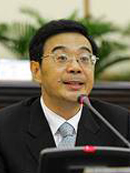 Name
Name
Zhou Qiang 周强
Current status
President, Supreme People’s Court
Born
1960
Relevance to Tibet
A sixth generation rising star, who may be in a Party leadership role in the future.
 Name
Name
Zhou Qiang 周强
Current status
President, Supreme People’s Court
Born
1960
Relevance to Tibet
A sixth generation rising star, who may be in a Party leadership role in the future.
Pronunciation: Joe Cheeyahng soundbite
Born: 1960
Education: One of the extraordinary group to take the first college entrance examination after the Cultural Revolution. M.A. in law, SW China University of Political Science & Law.
Career: In Ministry of Justice for about ten years. Headed Communist Youth League. Praised for radical improvement of Hunan’s economy (former Party Secretary). Named by UNEP as one of its “Champions of the Earth” for his work with China Mother River Protection Operation, which mobilised 300 million Chinese youth to protect the environment.
Prospects: A sixth generation rising star, possibly at the top of the Party in 2022. In 2013 appointed President of the Supreme People’s Court.
Relevance to Tibet: May be one of China’s most senior leaders in the future.
This is one of a number of “mini” profiles of 6th generation rising stars. See information in the Overview box, above right.
“Sixth generation” leaders were, in theory, due to reach the top in 2022, when the leaders who took office in 2012 have served two five-year terms. [Xi Jinping and Li Keqiang are fifth generation; Mao Zedong was first generation.] However, with Xi Jinping’s removal of the two-term limit, there is no telling when – or if – this generation will get its chance to lead.
Born in the 1960s, a number of sixth generation officials have been named by China commentators in recent years as having serious leadership prospects. They include: Hu Chunhua, Zhou Qiang, Nur Bekri, Lu Hao, Chen Min’er, Zhang Qingwei and Zhang Guoqing. Names that were previously on this list but have suffered political downfall are Sun Zhengcai and Su Shilin.
The tradition of former leaders selecting their successor’s successor – which applied to Deng Xiaoping (choosing Hu Jintao) and Jiang Zemin (choosing Xi himself) – would appear to be in serious doubt. Kerry Brown, writing in the Diplomat in December 2014 observed: “The idea of Xi Jinping’s predecessor Hu Jintao having much say in [the choice of next leader] seems to grow more remote with each passing day, as Xi appears more and more dominant. It goes against political, let alone psychological, logic to think that Xi might, for mere form’s sake, bow to Hu in his choice.”
A general summary of this age group by Melinda Liu, Newsweek, October, 2007:
Melinda Liu, writing in Newsweek in October, 2007, said: The ’60s Generation, as they’re also known, are seen as worldlier, more traveled and less doctrinaire than any previous Chinese generation….. the Gen-Sixers are less ideological and more market-savvy; their peers include private-sector millionaires and environmental activists. But they’re also apt to be nationalistic, even arrogant, some analysts say. “They lack the humility of [their elders],” says Cheng Li, a Sinologist at the Brookings Institution in Washington. “Some of them are quite spoiled, in my view.”